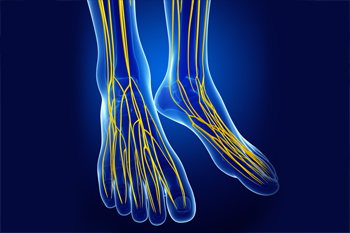Connect With Us
Items filtered by date: September 2021
Various Treatments for Plantar Hyperhidrosis
 Plantar hyperhidrosis is a condition that causes excessive sweating from the feet. There are several possible treatments that your podiatrist can prescribe to reduce sweating. Treatments containing aluminum chloride, an antiperspirant, can be applied directly to the skin and are often very effective at managing excessive sweating. Topical treatments may not be suitable for those with hypersensitive skin or those with open foot wounds. Iontophoresis, a treatment that uses electrical currents to prevent excessive sweating, is safe, effective, and relatively inexpensive. Other potential treatment options include Botox injections into the feet and minimally invasive surgical procedures. These are usually suggested for patients who have not seen improvements with other treatment options. For more information about treating plantar hyperhidrosis, please consult with a podiatrist.
Plantar hyperhidrosis is a condition that causes excessive sweating from the feet. There are several possible treatments that your podiatrist can prescribe to reduce sweating. Treatments containing aluminum chloride, an antiperspirant, can be applied directly to the skin and are often very effective at managing excessive sweating. Topical treatments may not be suitable for those with hypersensitive skin or those with open foot wounds. Iontophoresis, a treatment that uses electrical currents to prevent excessive sweating, is safe, effective, and relatively inexpensive. Other potential treatment options include Botox injections into the feet and minimally invasive surgical procedures. These are usually suggested for patients who have not seen improvements with other treatment options. For more information about treating plantar hyperhidrosis, please consult with a podiatrist.
If you are suffering from hyperhidrosis contact one of our podiatrists of Podiatry Health Center. Our doctors can provide the care you need to attend to all of your foot care needs.
Hyperhidrosis of the Feet
Hyperhidrosis is a rare disorder that can cause people to have excessive sweating of their feet. This can usually occur all on its own without rigorous activity involved. People who suffer from hyperhidrosis may also experience sweaty palms.
Although it is said that sweating is a healthy process meant to cool down the body temperature and to maintain a proper internal temperature, hyperhidrosis may prove to be a huge hindrance on a person’s everyday life.
Plantar hyperhidrosis is considered to be the main form of hyperhidrosis. Secondary hyperhidrosis can refer to sweating that occurs in areas other than the feet or hands and armpits. Often this may be a sign of it being related to another medical condition such as menopause, hyperthyroidism and even Parkinson’s disease.
In order to alleviate this condition, it is important to see your doctor so that they may prescribe the necessary medications so that you can begin to live a normal life again. If this is left untreated, it is said that it will persist throughout an individual’s life.
A last resort approach would be surgery, but it is best to speak with your doctor to find out what may be the best treatment for you.
If you have any questions please feel free to contact our office located in Dothan, AL . We offer the newest diagnostic and treatment technologies for all your foot care needs.
Read more about Hyperhidrosis of the FeetAre You Suffering From Ingrown Toenails?
What Is Retrocalcaneal Bursitis?
Retrocalcaneal bursitis is an inflammation of the fluid-filled sac (bursa) located at the back of the heel. It is a common cause of heel pain and occurs due to issues such as overuse, wearing high heels or ill-fitting shoes, having tight calf muscles, a heel injury, a Haglund’s deformity, or another medical conditions like gout or arthritis. Symptoms of retrocalcaneal bursitis include heel pain and tenderness, swelling, and ankle stiffness. This condition generally responds well to conservative treatments such as resting and icing the heel, taking anti-inflammatory medications, and wearing orthotics and comfortable shoes. Calf stretches and specific exercises for heel bursitis can also help. If you are experiencing any heel pain, please consult with a podiatrist.
Many people suffer from bouts of heel pain. For more information, contact one of our podiatrists of Podiatry Health Center. Our doctors can provide the care you need to keep you pain-free and on your feet.
Causes of Heel Pain
Heel pain is often associated with plantar fasciitis. The plantar fascia is a band of tissues that extends along the bottom of the foot. A rip or tear in this ligament can cause inflammation of the tissue.
Achilles tendonitis is another cause of heel pain. Inflammation of the Achilles tendon will cause pain from fractures and muscle tearing. Lack of flexibility is also another symptom.
Heel spurs are another cause of pain. When the tissues of the plantar fascia undergo a great deal of stress, it can lead to ligament separation from the heel bone, causing heel spurs.
Why Might Heel Pain Occur?
- Wearing ill-fitting shoes
- Wearing non-supportive shoes
- Weight change
- Excessive running
Treatments
Heel pain should be treated as soon as possible for immediate results. Keeping your feet in a stress-free environment will help. If you suffer from Achilles tendonitis or plantar fasciitis, applying ice will reduce the swelling. Stretching before an exercise like running will help the muscles. Using all these tips will help make heel pain a condition of the past.
If you have any questions please contact our office located in Dothan, AL . We offer the newest diagnostic and treatment technologies for all your foot and ankle needs.
Foot Pain in Diabetic Patients
 Foot pain that is common among diabetic patients is often caused by elevated blood sugar levels. Intense pain and poor circulation in the feet can be a result of damaged nerve endings that is caused by high glucose levels. Patients who have diabetic foot pain can experience tingling sensations, numbness, and existing wounds may take longer to heal. Some of the foot conditions that can develop if foot pain is left untreated can include calluses, ulcers, cracked skin, and possible amputations. Methods that can be implemented which may help to avoid diabetic foot problems can consist of incorporating exercise and healthy eating habits into your daily routine, and checking your feet daily for cuts and bruises. Additionally, it can be beneficial to wear shoes while inside, as this may limit the number of wounds that can develop on the feet. If you have diabetes, it is strongly suggested that you are under the care of a podiatrist who can effectively help you to manage this condition.
Foot pain that is common among diabetic patients is often caused by elevated blood sugar levels. Intense pain and poor circulation in the feet can be a result of damaged nerve endings that is caused by high glucose levels. Patients who have diabetic foot pain can experience tingling sensations, numbness, and existing wounds may take longer to heal. Some of the foot conditions that can develop if foot pain is left untreated can include calluses, ulcers, cracked skin, and possible amputations. Methods that can be implemented which may help to avoid diabetic foot problems can consist of incorporating exercise and healthy eating habits into your daily routine, and checking your feet daily for cuts and bruises. Additionally, it can be beneficial to wear shoes while inside, as this may limit the number of wounds that can develop on the feet. If you have diabetes, it is strongly suggested that you are under the care of a podiatrist who can effectively help you to manage this condition.
Diabetic foot care is important in preventing foot ailments such as ulcers. If you are suffering from diabetes or have any other concerns about your feet, contact one of our podiatrists from Podiatry Health Center. Our doctors can provide the care you need to keep you pain-free and on your feet.
Diabetic Foot Care
Diabetes affects millions of people every year. The condition can damage blood vessels in many parts of the body, especially the feet. Because of this, taking care of your feet is essential if you have diabetes, and having a podiatrist help monitor your foot health is highly recommended.
The Importance of Caring for Your Feet
- Routinely inspect your feet for bruises or sores.
- Wear socks that fit your feet comfortably.
- Wear comfortable shoes that provide adequate support.
Patients with diabetes should have their doctor monitor their blood levels, as blood sugar levels play such a huge role in diabetic care. Monitoring these levels on a regular basis is highly advised.
It is always best to inform your healthcare professional of any concerns you may have regarding your feet, especially for diabetic patients. Early treatment and routine foot examinations are keys to maintaining proper health, especially because severe complications can arise if proper treatment is not applied.
If you have any questions please feel free to contact our office located in Dothan, AL . We offer the newest diagnostic and treatment technologies for all your foot care needs.
Read more about Diabetic Foot ConditionsWhen Nerve Damage Disrupts Messages Between the Brain and Feet
 The peripheral nervous system transmits signals between the central nervous system (brain and spinal cord) and organs and limbs. For example, peripheral nerves would send a signal to the central nervous system regarding pain in the foot and the brain would direct the body to respond accordingly—that is, when this messaging system works correctly. In peripheral neuropathy there is damage to the peripheral nerves, which impedes this messaging system. Peripheral neuropathy is commonly caused by diabetes, but may also be present due to heredity, side effects of chemotherapy, drug or alcohol abuse, and other illnesses. Peripheral neuropathy can trigger symptoms in the feet such as numbness or an inability to perceive pain or temperature, cramping, muscle weakness, or tingling. Diabetic neuropathy can be particularly problematic as even minor cuts or abrasions can go undetected and turn into wounds or ulcers. If you are experiencing any of the symptoms listed, contact a podiatrist for a full examination and evaluation to determine if you may have peripheral neuropathy.
The peripheral nervous system transmits signals between the central nervous system (brain and spinal cord) and organs and limbs. For example, peripheral nerves would send a signal to the central nervous system regarding pain in the foot and the brain would direct the body to respond accordingly—that is, when this messaging system works correctly. In peripheral neuropathy there is damage to the peripheral nerves, which impedes this messaging system. Peripheral neuropathy is commonly caused by diabetes, but may also be present due to heredity, side effects of chemotherapy, drug or alcohol abuse, and other illnesses. Peripheral neuropathy can trigger symptoms in the feet such as numbness or an inability to perceive pain or temperature, cramping, muscle weakness, or tingling. Diabetic neuropathy can be particularly problematic as even minor cuts or abrasions can go undetected and turn into wounds or ulcers. If you are experiencing any of the symptoms listed, contact a podiatrist for a full examination and evaluation to determine if you may have peripheral neuropathy.
Peripheral artery disease can pose a serious risk to your health. It can increase the risk of stroke and heart attack. If you have symptoms of peripheral artery disease, consult with one of our podiatrists from Podiatry Health Center. Our doctors will assess your condition and provide you with quality foot treatment.
Peripheral artery disease (PAD) is when arteries are constricted due to plaque (fatty deposits) build-up. This results in less blood flow to the legs and other extremities. The main cause of PAD is atherosclerosis, in which plaque builds up in the arteries.
Symptoms
Symptoms of PAD include:
- Claudication (leg pain from walking)
- Numbness in legs
- Decrease in growth of leg hair and toenails
- Paleness of the skin
- Erectile dysfunction
- Sores and wounds on legs and feet that won’t heal
- Coldness in one leg
It is important to note that a majority of individuals never show any symptoms of PAD.
Diagnosis
While PAD occurs in the legs and arteries, Podiatrists can diagnose PAD. Podiatrists utilize a test called an ankle-brachial index (ABI). An ABI test compares blood pressure in your arm to you ankle to see if any abnormality occurs. Ultrasound and imaging devices may also be used.
Treatment
Fortunately, lifestyle changes such as maintaining a healthy diet, exercising, managing cholesterol and blood sugar levels, and quitting smoking, can all treat PAD. Medications that prevent clots from occurring can be prescribed. Finally, in some cases, surgery may be recommended.
If you have any questions, please feel free to contact our office located in Dothan, AL . We offer the newest diagnostic and treatment technologies for all your foot care needs.
Read more about Peripheral Artery Disease

